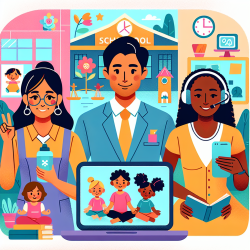In the evolving landscape of online therapy services, the role of Speech Language Pathologists (SLPs) is more critical than ever. With the advent of digital platforms, the ability to create and utilize effective tools for therapy has become a vital skill. At TinyEYE, we understand the unique challenges and opportunities that come with providing online therapy services. This blog aims to guide SLPs in developing and implementing tools that can enhance their practice and improve client outcomes.
One of the first steps in creating effective tools for online therapy is understanding the specific needs of your clients. Each client is unique, and their therapy tools should reflect their individual goals and challenges. Here are some strategies to consider:
- Assessment and Customization: Begin with a thorough assessment to identify the client's strengths and areas for improvement. Use this information to customize therapy tools that are tailored to their needs.
- Engagement and Motivation: Online therapy can sometimes feel impersonal, so it's essential to create tools that engage and motivate clients. Interactive games, visual aids, and personalized activities can make a significant difference.
- Feedback and Adaptation: Regular feedback from clients is crucial. Use this feedback to adapt and refine your tools continuously. What works for one client may not work for another, so flexibility is key.
At TinyEYE, we provide a range of resources to help SLPs create effective online therapy tools. Our platform includes customizable templates, interactive activities, and a library of resources designed specifically for online therapy. Here are some features that can enhance your practice:
- Customizable Templates: Our templates allow you to create personalized activities that align with your client's therapy goals.
- Interactive Activities: Engaging activities that keep clients motivated and involved in their therapy sessions.
- Resource Library: A comprehensive library of materials that you can use to supplement your therapy sessions.
In addition to creating effective tools, it's also important to consider the broader context of mental health. Online therapy services provide a unique opportunity to address mental health issues in a supportive and accessible environment. As SLPs, we play a crucial role in supporting our clients' overall well-being. Here are some ways to integrate mental health considerations into your practice:
- Holistic Approach: Consider the whole person, not just their speech and language needs. Addressing mental health can significantly impact therapy outcomes.
- Collaboration: Work with other professionals, such as psychologists and counselors, to provide comprehensive care.
- Continual Learning: Stay informed about the latest research and best practices in mental health to enhance your therapy services.
Creating effective tools for online therapy is an ongoing process that requires creativity, flexibility, and a deep understanding of your clients' needs. At TinyEYE, we are committed to supporting SLPs in this journey. By leveraging our resources and adopting a client-centered approach, you can enhance your practice and make a meaningful impact on your clients' lives.
If you're ready to take the next step in your online therapy practice, we invite you to explore the resources available on the TinyEYE platform. Together, we can create a brighter future for our clients and ourselves.
To learn more about how TinyEYE can support your online therapy practice, visit our website today. Let's make a difference, one session at a time.










